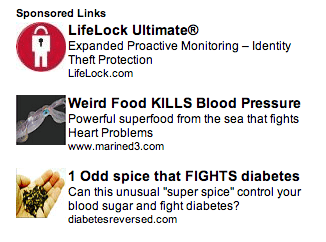So we’ve learned that the government now has access to a lot of the data that big corporations have been collecting for many years. Let’s step back for a moment from the recent revelations about the government’s access to this data and consider some of what the private sector has been collecting about us, and what they’ve been unable to do with it.
I just got back from the Giant supermarket, where I used my bonus card to purchase a couple cases of water.
“Be sure to take your bags and your receipt,” the electronic voice said at the self-checkout, “and any special coupons that may have been printed just for you.”
Those special coupons are a crude example of “data-mining.” Giant keeps a record of what gets bought with our bonus card account and every once in a while the register spits out a coupon for something we regularly buy there.

This database is apparently bigger than just Giant, because twice now the supermarket has given us coupons for epsom salts. We don’t buy those at Giant, because they don’t carry the lavender scented ones the ‘vixen likes for baths. The only place that carries those around here is Rite Aid, where we buy them using our Rite Aid bonus cards. So our pharmacy and our supermarket seem to be in cahoots, sharing the consumer data they’re both collecting on us.
I suppose that counts as an erosion in privacy. Using these affinity bonus cards means we sacrifice the ability to shop anonymously, in exchange for which we are “rewarded” with modest discounts on prescriptions from the pharmacy and with “bonus points” that can be redeemed for discounted gas at the Giant with the gas station (all the way out in Phoenixville — worth the hike once we’ve collected $1.20 off per gallon).
I’m not terribly concerned about Giant and Rite Aid acting as Big Brother, though, since it’s also clear that they’re not particularly nimble or efficient at mining all of the data they’ve collected from our household purchases. We still get junk-mail fliers and circulars from both chains — undifferentiated bulk mailings identical to the ones sent to all of our neighbors. And the various “special coupons printed just for you” are often just generic manufacturer discounts on whatever new product is currently being hyped.
Considering the massive amount of data these companies have collected about our shopping habits and all the patterns and inferences and conclusions that might theoretically be drawn from that data, I’m generally unimpressed with their ability, desire or ambition for “mining” all that they might learn about us from the information we’re allowing them to collect.
And Giant is hardly alone. Most of my consumer data is being collected by huge corporations, and most of them seem to have little or no idea what to do with all that data.
My cellphone service comes through Verizon’s family plan. That provides them with a vast amount of data about my connections, relationships and daily movements that could, theoretically, allow them to know everything about me. (Cue ominous background music.) Yet apparently either Verizon hasn’t figured out any way to effectively monetize such information, or else they’re simply not capable of or not inclined to do so.
Again, look in the mailbox. Almost every day brings another piece of direct-mail advertising from Verizon — all of it generic bulk mail, identical to the generic bulk mailings sent to everyone else for whom Verizon has managed to collect a valid address. Some of those mailings don’t even seem to recognize that we’re already Verizon customers — a significant piece of “data” that the company shouldn’t even need to “mine.”
Most of those Verizon mailings are about Fios — hoping to lure our family away from Comcast, the “service provider” with which we have an Xfinity “triple play” bundle of services providing our broadband Internet, cable TV and landline telephone service. (I don’t know the landline number and we don’t have an actual phone plugged into any phone jack in our house.)
Comcast, in theory, could also know everything about me. (Dum dum dummmm!) Every website I visit. Every email I send or receive. Every channel I tune into or show I watch “on demand.” I’m certain that Comcast — like Giant, Rite Aid and Verizon — is collecting all of that data, yet again I see no evidence that they have any idea, intention or capability to put any of it to meaningful use. See again the flood of generic bulk-mail advertising. Or see the generic, same-as-everyone-else’s ads on our TV and in our browsers.
This last example is particularly notable, since this is where it seems like data-mining ought to be easily monetized. But they’re not taking advantage of that readily available data on their cable and Internet subscribers. Our interface with cable TV and with the Internet doesn’t change over time, tailoring itself to our habits and patterns of use. The potential is there, but for whatever reason — inefficiency, incompetence, expense — it remains untapped.
I watch an episode of Doctor Who “on demand.” Every ad break plays the same ad, for a diabetes monitor. I watch another episode of Doctor Who, and another, and another. By doing so, I’m supplying Comcast with data — useful, potentially marketable data. A Doctor Who fan lives here. And yet the ads for the on-demand episodes never change. This despite the fact that the data readily available from Rite Aid and Giant clearly shows that no one in my household is diabetic.
Either Comcast is privy to some study showing a high correlation between the occurrence of diabetes and a fondness for British sci-fi, or else I have to conclude that Comcast sucks at data mining.
They’re not alone. Most big companies suck at data mining. They’re all collecting massive, potentially intrusive, amounts of data about all of us, but they don’t seem to have any idea how to use it.
Want another example? I no longer work for a newspaper. Like tens of thousands of other former newspaper editors, reporters, photographers and staff, I was laid off. I was laid off, in part, because huge media companies don’t have the slightest clue what to do with the consumer data they’re collecting about their readers. That, in turn, means that online ad revenue for newspapers is a paltry fraction of print ad revenue, and so, for newspapers, growing online readership has meant a steady loss in income.
The paper I worked for is owned and operated by the biggest newspaper chain in the world. It’s the biggest paper in Delaware, and the only daily paper for most communities in that state. But most of its online advertising has nothing to do with Delaware — and even less to do with the particular concerns and interests of any regular individual reader.
“Bob” visits Delawareonline every day. And the first thing he checks, every day, is the high school sports section, where he checks to see how Salesianum did. Bob is supplying the paper with data. What do we now know about Bob? Well, he’s a sports fan. He’s probably Catholic. And he’s probably got either a son or a nephew in high school.
Yet what ads appear when Bob checks every day for the latest scores and highlights on the Sals? Does Bob see ads targeted to appeal to him as a sports fan, or as a Catholic, or as the parent of a teenager? No. He sees the same generic click-whore ads for dubious weight-loss schemes that you’ll find anywhere else on the Internet.
Which is why Bob doesn’t visit Delawareonline as much as he used to. Because the budget for stringers to cover high school sports got slashed after the last round of layoffs.
So again, almost every big corporation you deal with is collecting data about you. A lot of data. And yet almost every one of those companies is absolutely terrible about figuring out what to do with any of that information.
That shouldn’t mean that all of this data-collection isn’t still disturbing. We’re making a precarious bargain with all of these companies, accepting “special coupons” or cool new wireless or Internet features in exchange for providing them with massive amounts of information about our interests, expenses, patterns and relationships. But to some extent we’ve all been lulled into not worrying that they will abuse this access to our information simply because they’ve been so incompetent at using any of it.
Corporate incompetence shouldn’t be the only safeguard against such abuse.
And now, of course, we’ve learned that government agencies like the NSA have gained access to all of this data the corporations have been collecting and compiling. The NSA, we assume, has more ambitious plans for mining this data than retailers and service providers apparently did. And unlike the corporations, the NSA won’t be put off from doing so by any difficulties in making such a scheme profitable.
















